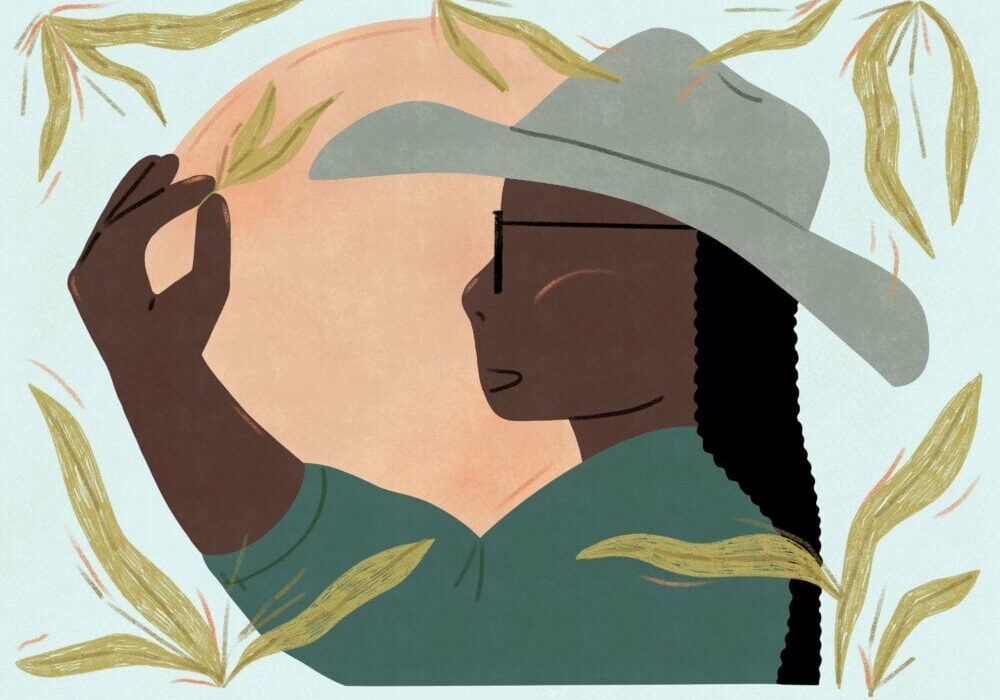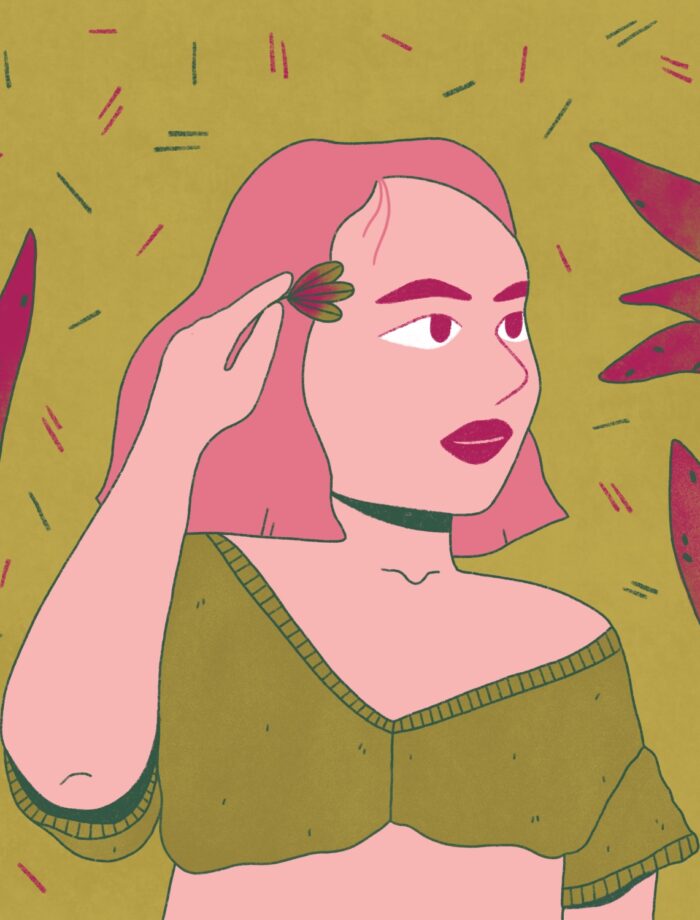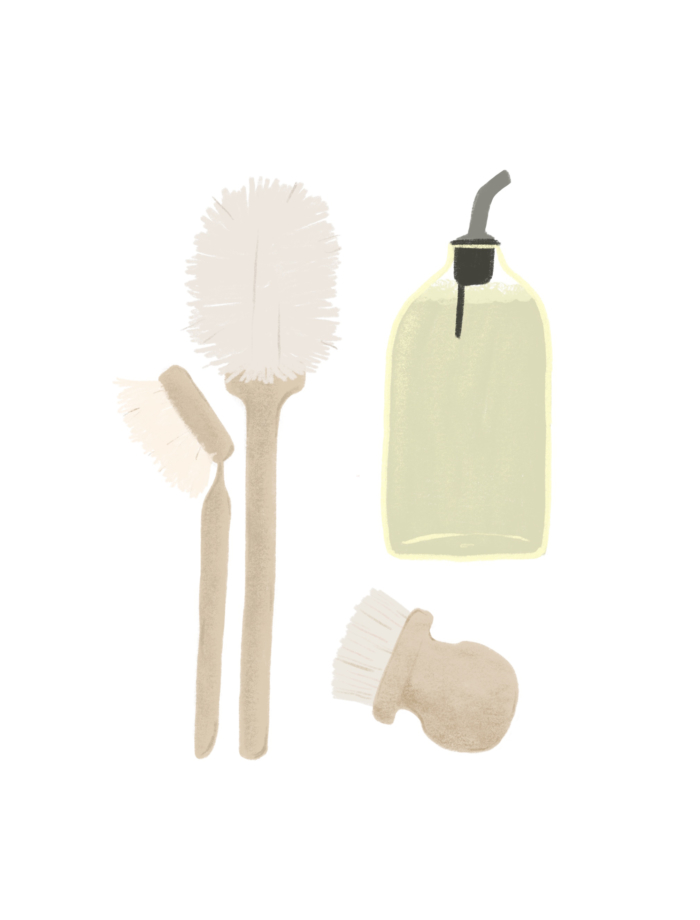Illustration by Hawnuh Lee.
Shellie-Ann Kerns is a Master Gardener, farmer, and community organizer building a sustainable farm from scratch in western Washington. She comes from a family of Jamaican subsistence farmers, and grew up witnessing firsthand how immigrant labor is inhumanely exploited in the U.S. Now, they’re on a mission to create a justice-centered local food community powered by fresh, nutritious produce, regenerative farming practices, education, and mutual ownership.
I got to talk with Shellie-Ann about transitioning out of a job totally unrelated to farming, the serendipitous connection that allowed her to transform logged timberland to fertile farmland without even owning a tractor, sourdough bakery dreams, hyperlocal food swaps, and so much more.
Tell me a bit about your background and what you do.
I am an immigrant from Jamaica, and I’ve been in the U.S. for seven years now. I live in Washington State in the Middle Satsop Valley, which is at the confluence of numerous food deserts. I am working to build a sustainable farm to feed my community and to encourage people to get into the habit of growing their own food and foraging from the wild native flora that exists here.
Four or five generations of my family have come to the U.S. and Canada to provide migrant labor seasonally, keeping their own small holdings back in Jamaica to return to during the winter when there was no work here. So I grew up in an environment where we had homegrown food, livestock, little goats that I had to tie out in pasture, eggs that I gathered from all over the yard… My mom kept an herb garden for medicinals and my father grew cash crops.
I got furloughed when the pandemic hit, and that’s when I started to focus on how disrupted the supply chain is, and how bringing more local food closer to the people could help solve that problem.
I never aspired to farming, although I did appreciate having access to fresh food. I saw it as an activity for the poor who didn’t have other options. So I pursued aviation as a career, and up to a couple of weeks ago when I resigned to throw myself entirely into farming, I was actively employed as an aircraft dispatcher. I got furloughed when the pandemic hit, and that’s when I started to focus on how disrupted the supply chain is, and how bringing more local food closer to the people could help solve that problem.
What a career shift!
Yeah, and I actually liked what I did. I mean, it required me to be super situationally aware, monitoring and planning flights — but it was also ten hours at a desk every day, so even though I was psychologically working out, my body was sort of latent. The shift to farming has been really great for me overall because I like the physical aspect and the capacity I have to work outside. But the drawback of resigning and farming full time is the loss of reliable health insurance and reliable income.
What has the process of getting Bunkhouse Acres off the ground been like so far?
I started getting the land ready while I was furloughed, and this will be my first full season. There was a lot of clearing to do on the land. It’s timberland and several years ago it was logged, so in most of the more fertile spots there were stumps that were like four feet across and lots of invasive plants that had to be removed. There was also a bunch of junk metal on the property. So this complete transformation is literally happening before my eyes.
I was featured on a news segment last year and an incarcerated gentleman named Laurence Jenkins saw it and reached out to a bunch of his friends in Olympia who were interested in horticulture and food justice. They ended up coming out practically every weekend in the summer and gave me a hand with so much of the work.
I’m still friends with a bunch of them, I organize work parties when I can, and they’ve been coming out in smaller numbers whenever I have a need. I’m very grateful for that community I was able to build through somebody who is currently behind bars for no good reason.
What is Bunkhouse Acres’s mission?
I want to make sure that fresh, nutrient-dense, local food becomes part of what’s on everybody’s table — so that it’s not just a metropolitan ideal. I want to make sure that I am pricing produce so people who are struggling to afford local healthy food can actually afford it. I feel like even though I am in an ideologically different realm than a lot of people in my area, healthy food is a human right.
Reusing your waste products to further enrich the soil is just built into the farming mentality in Jamaica. I was surprised when I came to the U.S. that it was considered to be something special, or like an extra step.
So hopefully I can bridge that gap by bringing good food to everybody. I also want to provide educational programming to teach children and adults about different ingredients, different wild native plants in the region, and their uses.
Tell me about the launch of your CSA.
I’m currently preparing for my first CSA season where I anticipate I’ll be feeding 50 families this summer. Most of the folks found me on Instagram, so social media has been really helpful. At first I noticed that most of the people signing up were not in my immediate area, and I realized it was likely a matter of cost. So I added in the option for people who were not in my vicinity to sponsor a CSA share for a family that’s near the farm, and now that’s essentially how a quarter of the CSA is going to be distributed. I’m also working with local food pantries and will be donating food to them consistently.
What types of fruits and veg are you cultivating?
For fruit, there are some established apples here already, we’ll have strawberries, and start blueberries too but they take a couple of years to produce a full crop. For vegetables, I have the standard tomatoes, cucumbers, zucchini, lettuce, spinach, arugula, edible flowers… And then I have a few rarer items like agretti (an Italian green), shallots, various types of onion… I have amaranth, which is a classic from Jamaica but it grows so well here that it’s actually considered a weed. And another weed type plant is purslane, which is super delicious and nutritious and is common in Middle Eastern cuisine.
How does your family background and history influence your farming?
I grow a few staples from back home like I mentioned — amaranth, Jamaican pumpkins, and lots of hot chili peppers. I’m not sure how marketable the hot peppers would be in this area but I’m really good at preserving food and I do hope to eventually branch out into making spice blends. In terms of the practice, sustainable farming — reusing your waste products to further enrich the soil — is just built into the farming mentality in Jamaica. I was surprised when I came to the U.S. that it was considered to be something special, or like an extra step. My mindset has always been regenerative in terms of being conscious of my inputs and trying to waste as little as possible.
You’ve talked about adding a teaching kitchen and bakery component at Bunkhouse Acres — tell me about your plans for that.
I would love to eventually be able to have a bread bakery here. Unfortunately, I don’t have the infrastructure yet at this point, which is part of why I’m crowdfunding. But in the winters I am planning on having a residential bread school where folks can come and spend a couple of nights to bake bread with me and learn all about how sourdough works!
What else are you currently raising funds for?
I raised over 30K already on GoFundMe [ed note: they’re now up to 76K!] and that money has been largely put towards buying my new tractor. Before I was clearing all the land by hand, and the tractor has helped make that work so much faster.
I still have a huge irrigation project going on. My property has a water right that grants it access to water from the river. However, I have a racist neighbor that has been blocking that supply, and it will likely end up having to be a lawsuit situation. My alternative until I get to the point where I want to be battling someone in court is to drill a well on the land here. That way I’d have reliable access to water that’s completely under my control. So the irrigation is a huge part of the money that I still want to raise.
And then of course there’s the demonstration kitchen for the bakery.
I love growing food, it’s my passion. And I feel like the more money I raise, the more I’ll be able to reach people with not only my produce, but also my ideas and philosophy about food, and dismantling the colonial systems that have essentially destroyed the ways we eat.
What else are you dreaming up for the future of Bunkhouse Acres?
In the past, I’ve put on food bartering exchanges in my county where I encourage people to forage, preserve, and grow food, and then we do a hyperlocal community exchange. I started the Grays Harbor Food Swap back in 2015. I essentially borrowed spaces around the county and put it out on the internet where other people who were crafters, bakers, wild foragers, gardeners, food preservers, etc. could come together and swap their stuff without exchanging any money. There are a few food swaps in existence across the country (the Food Swap Network is a good resource for finding one that’s local to you), but for Grays Harbor County it was brand new, and it was really well received. I hope to keep doing more things like that.
So part of my main focus is rights for people who are working — not just migrant workers but workers in general. I want people to feel valued and seen and not a sense of expendability and deportability.
Eventually, I would love for this farm to be a community people can rely on for a supply of good food, where they can feel safe and have the opportunity to work in the soil, where aspiring farmers could come intern before they’re able to get their own land, and where my workers feel like they are being supported, treated fairly, and have a sense of ownership.
Generations of my family, including my brother who I had to extract from a farm last summer, have been coming to the U.S. and working under exploitative conditions because we were poor and just didn’t have the resources. I recently became a citizen, but as a migrant farmworker you’re completely at the mercy of that single employer, so if they don’t treat you well you can’t just get off of that farm and go work for somebody else. If they want to fire you there’s no justice, they just send you home. You are deportable labor. So part of my main focus is rights for people who are working — not just migrant workers but workers in general. I want people to feel valued and seen and not a sense of expendability and deportability.
Thank you so much Shellie-Ann! I learned so much from this conversation, and we are so inspired by your story.
Shellie-Ann is hosting a farm launch party at Bunkhouse Acres for Juneteenth! Admission is free and by invitation only. “Liberation + Libations will provide a laid-back space for descendants of enslaved people to celebrate freedom with food and fellowship on land stewarded by a black woman, in a state where we tend to be few and far between” Allies are invited to provide sponsorship: FUND BLACK JOY.
Make sure to support Bunkhouse Acres by donating, following on Instagram, and sharing far and wide.





